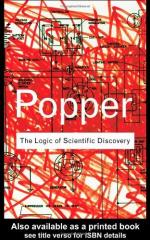
|
| Name: _________________________ | Period: ___________________ |
This test consists of 15 multiple choice questions and 5 short answer questions.
Multiple Choice Questions
1. In chapter 9, what does Popper use to test his probability theory?
(a) Mathematics.
(b) Quantum physics.
(c) Psychology.
(d) Biology.
2. What leads to scientific advances?
(a) Creating hypotheses.
(b) The passion for knowledge.
(c) Proving theories are invalid.
(d) The quest for knowledge.
3. What is complimentary to the degree of falsifiability?
(a) Justifications.
(b) Probability.
(c) Logic.
(d) Empty classes.
4. What view of probability depends on inductive logic?
(a) Hypothetical view.
(b) Naturalistic view.
(c) Inductive view.
(d) Deductive view.
5. How does Popper explain the differences in his selection process?
(a) Using ordinal numbers.
(b) Using discrete categories.
(c) Using letters.
(d) Using rational numbers.
6. What does Popper assume is a main characteristic of quantum theory formula?
(a) It is dependent on the number of particles present.
(b) It has definitive answers.
(c) It is a probability hypothesis.
(d) It is subject to time.
7. What theory does Schrödinger begin this investigation with?
(a) Particle theory.
(b) Sound theory.
(c) Light theory.
(d) Wave theory.
8. If two statements have equal logical content what must also be equal?
(a) Their justification.
(b) Empirical content.
(c) Their inductive reasoning.
(d) Their logical probability.
9. What is Feigl's reasoning to the motion of simplicity?
(a) It reveals more empirical content.
(b) It can be better tested.
(c) It can be better justified.
(d) It appeals to the economy of thought.
10. How does Popper negate positivist notions regarding the meaninglessness of certain scientific statements?
(a) Including abstract statements.
(b) Including synthetic statements.
(c) Failing to justify statements.
(d) Conducting empirical research.
11. Why does Popper find Heisenberg's lack of logic and statistical testing disturbing?
(a) The theory is metaphysical without these factors.
(b) The theory is not logical without these factors.
(c) It lacks scientific validity.
(d) It lacks original thought.
12. According to Popper, since measurement can be altered what does that say about using measurement in science?
(a) Measurement is not valid.
(b) It cannot be used as a basis for prediction.
(c) It should be used as a basis for prediction.
(d) Measurement is reliable.
13. What are easier to test and falsify?
(a) Simple structures.
(b) Unified structures.
(c) Singular structures.
(d) Complex structures.
14. What is metaphysical unless made to be falsifiable?
(a) Theoretical statements.
(b) Probability statements.
(c) Law statements.
(d) Hypothetical statements.
15. What is considered only if one class includes the other?
(a) Sub-justifications.
(b) Sub-tests.
(c) Sub-dimensions.
(d) Sub-classes.
Short Answer Questions
1. What should researchers abstain from doing with regard to the probabilities of their research?
2. What involves considering the number of favorable cases divided by the number of possible cases?
3. What is shown to be equal in issues relating to power of classes?
4. Who does Popper feel has been unsuccessful in purging atomic science of metaphysical influences?
5. What is the result, according to Popper, when inductive logic is used?
|
This section contains 442 words (approx. 2 pages at 300 words per page) |

|




